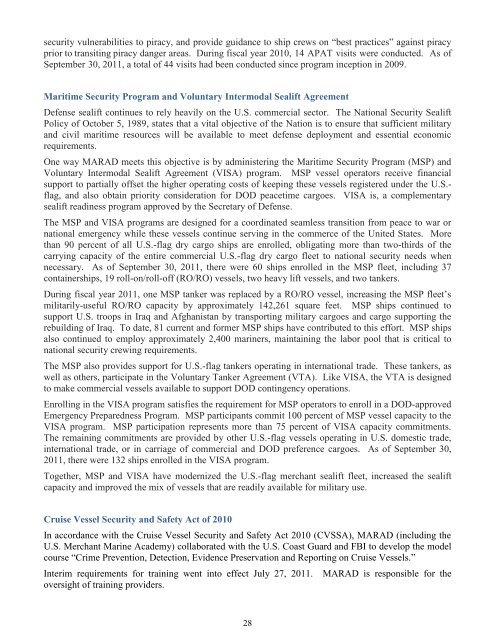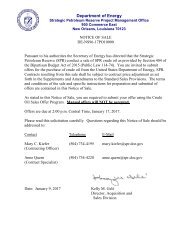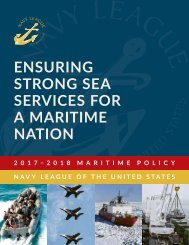2010-11_ANNUAL_REPORTS_-_FINAL_VERSION_(3)
2010-11_ANNUAL_REPORTS_-_FINAL_VERSION_(3)
2010-11_ANNUAL_REPORTS_-_FINAL_VERSION_(3)
Create successful ePaper yourself
Turn your PDF publications into a flip-book with our unique Google optimized e-Paper software.
security vulnerabilities to piracy, and provide guidance to ship crews on “best practices” against piracy<br />
prior to transiting piracy danger areas. During fiscal year <strong>2010</strong>, 14 APAT visits were conducted. As of<br />
September 30, 20<strong>11</strong>, a total of 44 visits had been conducted since program inception in 2009.<br />
Maritime Security Program and Voluntary Intermodal Sealift Agreement<br />
Defense sealift continues to rely heavily on the U.S. commercial sector. The National Security Sealift<br />
Policy of October 5, 1989, states that a vital objective of the Nation is to ensure that sufficient military<br />
and civil maritime resources will be available to meet defense deployment and essential economic<br />
requirements.<br />
One way MARAD meets this objective is by administering the Maritime Security Program (MSP) and<br />
Voluntary Intermodal Sealift Agreement (VISA) program. MSP vessel operators receive financial<br />
support to partially offset the higher operating costs of keeping these vessels registered under the U.S.-<br />
flag, and also obtain priority consideration for DOD peacetime cargoes. VISA is, a complementary<br />
sealift readiness program approved by the Secretary of Defense.<br />
The MSP and VISA programs are designed for a coordinated seamless transition from peace to war or<br />
national emergency while these vessels continue serving in the commerce of the United States. More<br />
than 90 percent of all U.S.-flag dry cargo ships are enrolled, obligating more than two-thirds of the<br />
carrying capacity of the entire commercial U.S.-flag dry cargo fleet to national security needs when<br />
necessary. As of September 30, 20<strong>11</strong>, there were 60 ships enrolled in the MSP fleet, including 37<br />
containerships, 19 roll-on/roll-off (RO/RO) vessels, two heavy lift vessels, and two tankers.<br />
During fiscal year 20<strong>11</strong>, one MSP tanker was replaced by a RO/RO vessel, increasing the MSP fleet’s<br />
militarily-useful RO/RO capacity by approximately 142,261 square feet. MSP ships continued to<br />
support U.S. troops in Iraq and Afghanistan by transporting military cargoes and cargo supporting the<br />
rebuilding of Iraq. To date, 81 current and former MSP ships have contributed to this effort. MSP ships<br />
also continued to employ approximately 2,400 mariners, maintaining the labor pool that is critical to<br />
national security crewing requirements.<br />
The MSP also provides support for U.S.-flag tankers operating in international trade. These tankers, as<br />
well as others, participate in the Voluntary Tanker Agreement (VTA). Like VISA, the VTA is designed<br />
to make commercial vessels available to support DOD contingency operations.<br />
Enrolling in the VISA program satisfies the requirement for MSP operators to enroll in a DOD-approved<br />
Emergency Preparedness Program. MSP participants commit 100 percent of MSP vessel capacity to the<br />
VISA program. MSP participation represents more than 75 percent of VISA capacity commitments.<br />
The remaining commitments are provided by other U.S.-flag vessels operating in U.S. domestic trade,<br />
international trade, or in carriage of commercial and DOD preference cargoes. As of September 30,<br />
20<strong>11</strong>, there were 132 ships enrolled in the VISA program.<br />
Together, MSP and VISA have modernized the U.S.-flag merchant sealift fleet, increased the sealift<br />
capacity and improved the mix of vessels that are readily available for military use.<br />
Cruise Vessel Security and Safety Act of <strong>2010</strong><br />
In accordance with the Cruise Vessel Security and Safety Act <strong>2010</strong> (CVSSA), MARAD (including the<br />
U.S. Merchant Marine Academy) collaborated with the U.S. Coast Guard and FBI to develop the model<br />
course “Crime Prevention, Detection, Evidence Preservation and Reporting on Cruise Vessels.”<br />
Interim requirements for training went into effect July 27, 20<strong>11</strong>. MARAD is responsible for the<br />
oversight of training providers.<br />
28




